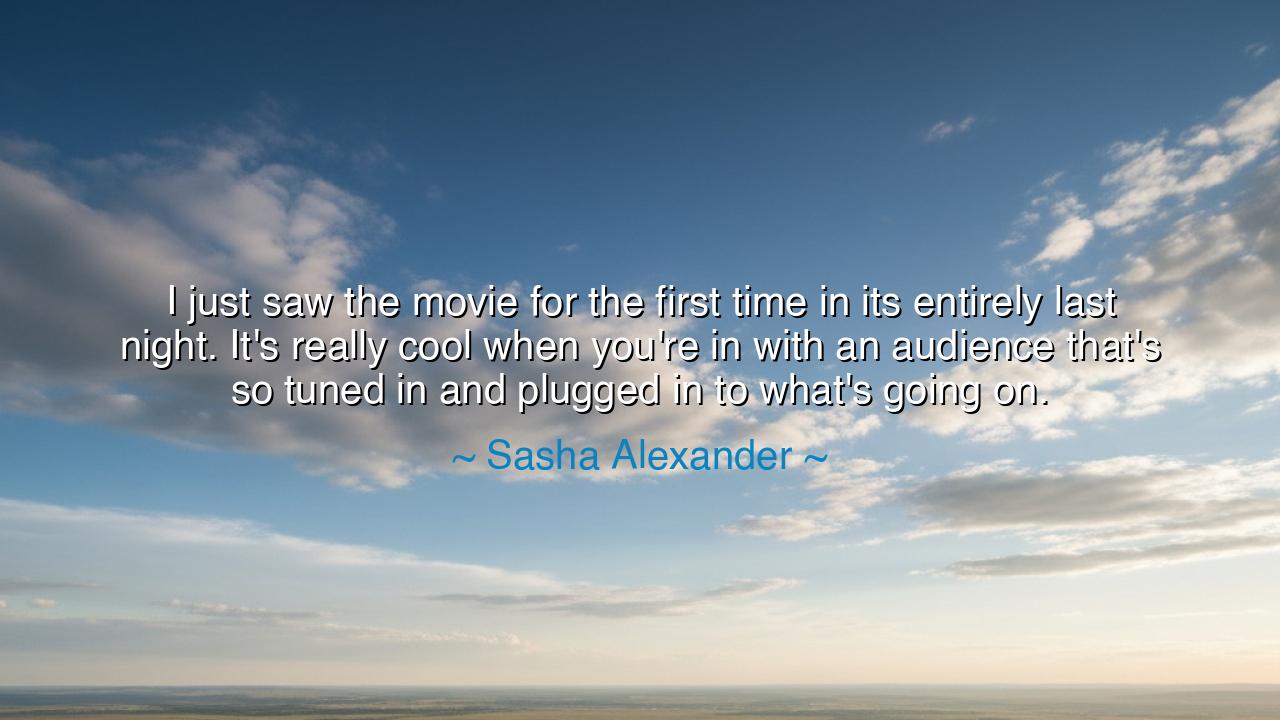
I just saw the movie for the first time in its entirely last
I just saw the movie for the first time in its entirely last night. It's really cool when you're in with an audience that's so tuned in and plugged in to what's going on.






In the ever-unfolding drama of human existence, there is a unique magic that arises when an individual’s experience is shared with others—when a group of souls becomes united in a collective moment of understanding, emotion, and awareness. Sasha Alexander’s words, "I just saw the movie for the first time in its entirety last night. It’s really cool when you're in with an audience that's so tuned in and plugged in to what's going on," speak to this powerful phenomenon. Here, she reflects on the profound connection that occurs when people come together, when the energy of the crowd amplifies the experience and heightens the meaning of the work being presented.
The ancients understood well the power of collective experience. In the great Greek theaters, where the tragedies of Sophocles and Euripides were performed, the audience was an integral part of the drama. It was not merely the actors who carried the weight of the performance, but the shared emotion of the crowd. The audience’s reactions—whether laughter, tears, or silence—created a feedback loop, enhancing the emotional weight of the story. A play in those times was not simply an isolated event for the performers but a communal ritual, where each individual’s response added depth and meaning to the unfolding tale. Alexander’s words resonate with this ancient tradition: it is the shared experience that gives power and life to the story.
This idea is echoed in the philosophy of Aristotle, who believed that the purpose of tragedy was not just to entertain but to cathart the emotions of the audience, to bring them through a process of purging their fears and anxieties. The crowd’s collective reaction to the performance—whether catharsis or joy—was essential to the completion of the work. It is not just the individual who benefits from the experience, but the group as a whole. Sasha Alexander, in her reflection, touches on the same idea: the magic of a shared experience is greater than the sum of its parts. When an audience is "tuned in and plugged in," the emotional resonance of the moment becomes infinitely more powerful.
In ancient times, the concept of the heroic journey often involved a community—whether a city, a tribe, or an entire civilization—that was invested in the success or failure of the hero. The hero’s struggles and victories were not theirs alone, but belonged to the collective. Homer's Iliad, for instance, is not just the story of Achilles or Hector, but the story of all who lived in the shadow of their battle. The tragedy and triumphs of the individual were mirrored in the hearts of the people, for they too were part of the grand narrative. This deep connection between hero and audience, between individual and collective, is precisely what Sasha speaks to in her reflection on the movie—it is the community that breathes life into the work.
The power of collective experience is also evident in military history. Consider the Romans, whose legions fought not just for victory but for the honor of their people. The battles they fought were not only about military strategy but about the shared identity and purpose of the Roman people. When the army returned victorious, the entire population shared in that triumph, experiencing the collective elation of victory. Conversely, in times of defeat, the collective sorrow was equally profound. Sasha Alexander’s recognition of the power of the audience reflects this same ancient truth: in a shared experience, whether victory or defeat, the emotions of the individual become the emotions of the whole.
In this light, the lesson of Sasha Alexander’s words is clear. Life itself is a shared story, one where we are all participants. It is easy to get lost in our individual struggles, to think of ourselves as isolated in our joys and sorrows. Yet, the truth is that our lives are inextricably linked to the lives of those around us. Just as a movie or a play becomes more than just a story when experienced together, so too does life gain meaning when we connect, share, and react together. It is in these shared moments that we find our truest selves.
Thus, in our daily lives, we must seek to engage more deeply with those around us. We must listen not just with our ears, but with our hearts, tuned in to the collective rhythm of the world around us. Whether in our families, communities, or workspaces, the power of connection is what transforms ordinary moments into extraordinary experiences. Just as an audience makes a performance come alive, so too do our relationships with others give life and depth to our personal stories. In the shared human experience, we find not only meaning but the profound beauty of life itself.






AAdministratorAdministrator
Welcome, honored guests. Please leave a comment, we will respond soon